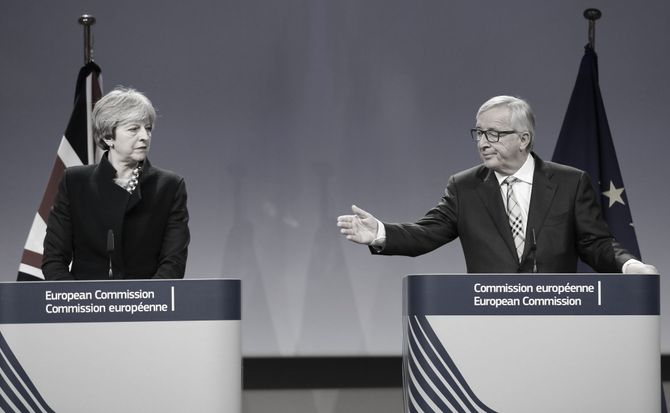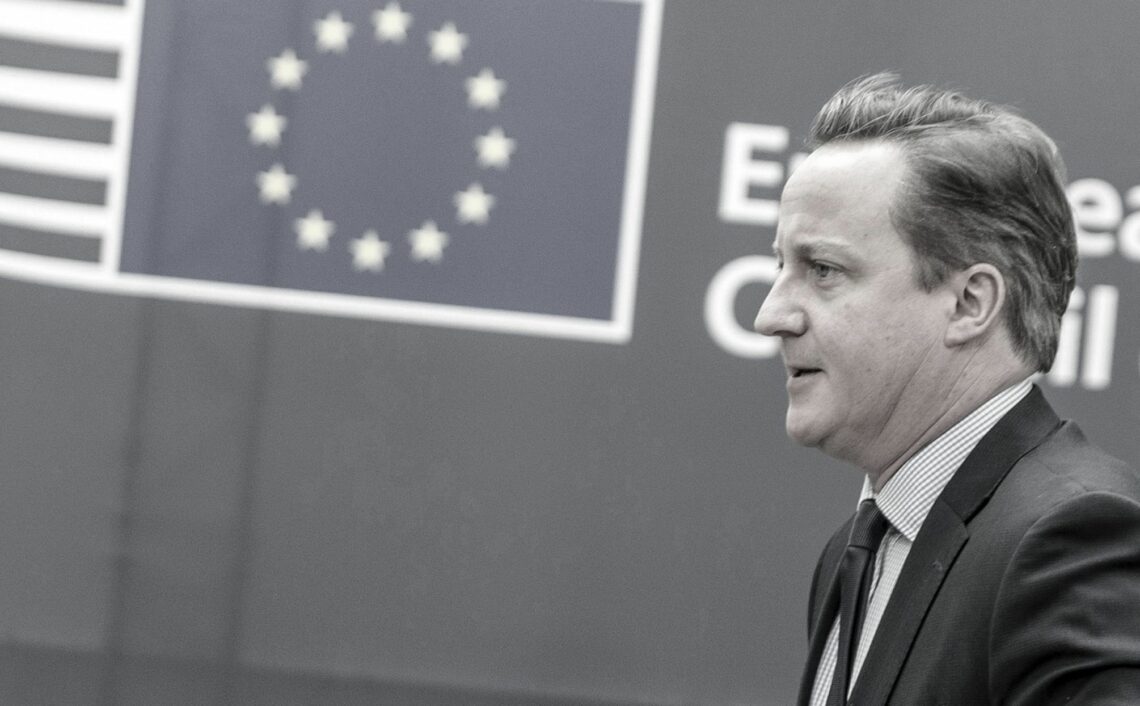Six lessons from Brexit
The UK and the EU have drawn little benefit from the Brexit negotiations. It did not have to be this way. The leadership on both sides made critical mistakes. As the process moves toward its next stage, the question is whether leaders can learn the lessons and take a more realistic stance.

In a nutshell
- The Brexit process so far has not benefited the UK or the EU
- Leaders on both sides made crucial mistakes that could have been avoided
- It is critical that political leaders learn the lessons from these miscalculations
As the Brexit negotiations lurch toward the endgame, Sir Michael Leigh, former chief European Union enlargement negotiator, reflects on the lessons that can be drawn from the experience of the last three years.
The Brexit negotiations, whatever their eventual outcome, have done little credit to the United Kingdom or to the European Union. Both will emerge weakened from the process, though Britain will clearly pay the higher price.
Brexit was never going to be easy. Former British Prime Minister David Cameron reluctantly held an “in or out” EU referendum in 2016 after he unexpectedly won a general election the previous year. His successor, Theresa May, an accidental prime minister, rashly called an early election in 2017 and lost her majority, ending up dependent on the small Northern Ireland Democratic Unionist Party (DUP).
She launched the Brexit process prematurely with no clear negotiating objectives, needless “red lines,” divided followers and dwindling authority. Successive Brexit ministers stumbled through the talks and misled the public.
The remaining member states were eager to show that secession carried a price.
By comparison, the EU negotiators were rational and determined. But they lacked the political sensitivity to grasp that a win-win outcome was needed to persuade the British parliament and public to accept the outcome. The 27 remaining member states, delighted to agree on something amid their multiple crises, weary of British special pleading and eager to show their own euroskeptics that secession carried a price, gave the European Commission free rein.
What takeaways from the negotiations might encourage both sides to navigate more safely through the murky waters of populist politics in the negotiations on future EU-UK relations that lie ahead?
1. EU-bashing doesn’t pay
British prime ministers and most of their continental counterparts claim victory over foreigners at press conferences after every European summit and blame the EU for domestic problems they cannot solve. Their declarations convey the impression that an alien EU of which they are not part has imposed on them unwelcome policies. They see no votes in explaining to their electorate complex decisions that they themselves accepted on behalf of their country.
Echoing several of his predecessors, David Cameron bashed the EU for seven years before the 2016 referendum. Little wonder that voters doubted his sudden claim that continued membership was a vital national interest.
Brexit’s first lesson: explain European political decisions to your electorate openly, early and truthfully, or the chickens will come home to roost.
2. Don’t throw red meat to populists
Mainstream parties throughout Europe face nationalist zealots within their own ranks and at the political extremes. Brexit is the result of euroskeptic populism with British characteristics. It arises from economic discontent, social tensions and “identity politics” that feed on each other. Brexit now dominates British politics, undermining its unwritten constitution and distracting the EU from other urgent challenges.

This worrying situation occurred mainly because British leaders continuously appeased euroskeptic ultras, fanning extremism in a divided political environment. This was an abdication of true leadership.
Brexit’s second lesson: do not give extremists red meat, or they will come back for more.
3. Beware of referendums
All EU countries are representative democracies, relying on free and fair elections to choose their rulers. Sound institutions are their strength. Most limit referendums to exceptional decisions concerning the country’s destiny. In practice, rumbling discontentment rather than the ostensible referendum question usually determines the result. People like to say “no” to their rulers. The Vote Leave campaign won the 2016 referendum on a narrow margin. Campaign financing abuses and a restricted franchise influenced the outcome.
No political leader can convincingly claim to be the only true interpreter of the will of the only true people, as expressed in a narrow referendum result. Yet Theresa May repeatedly argued that “the people” had instructed her to set out her “red lines” and wavering Brexit schemes. This approach alienated almost half the electorate and a majority of the House of Commons. It led to parliament’s repeated rejection of the withdrawal agreement that Prime Minister May had negotiated.
Brexit’s third lesson: avoid referendums, except when political institutions are unable to resolve a fundamental national dilemma. (Switzerland, which is outside of the EU, has a different tradition of direct democracy.)
4. Candid consultations strengthen a negotiator’s hand
The British government has now indicated that it will allow members of parliament to express their Brexit preferences in April if the negotiated withdrawal agreement fails to win approval and Brexit is postponed. But a broad consultation on Brexit options should have been the first step taken by Theresa May’s new government in 2016. A “Green Paper” would have provided an accepted basis for such a consultation.
Ministerial statements and screaming headlines implied that the parliament’s involvement was tantamount to treason.
This, rather than a last-minute consultation, when all top-down improvisations had failed, could have shaped the government’s negotiating stance and mobilized support for it. Instead, ministerial statements and screaming headlines implied that the parliament’s involvement after “the people” had spoken was tantamount to treason. It took a much-derided Supreme Court judgment to reassert the principle of parliamentary sovereignty. The government’s secretive approach to the negotiations contrasted with the EU’s relative openness.
The British government would have had a wider margin for negotiation if it had taken parliament and public opinion into its confidence, explaining frankly the complexity of the divorce settlement, the options for future UK-EU relations and the obstacles that needed to be overcome.
The fourth Brexit lesson: candid consultations can bolster negotiating positions.
5. Know your negotiating partners
The British government consistently underestimated the EU’s unity behind the mandate given to its chief negotiator, Michel Barnier. In public statements, behind-the-scenes contacts and well-publicized prime ministerial visits to European capitals, it failed to drive a wedge between the member states.
British ministers misled themselves and the public into believing that the continentals would cave in because of their trade surplus with Britain (the alleged prosecco and German car lobbies), their appreciation of Britain’s geopolitical importance or its special status as a future ex-member state. Ministers, in a classic case of groupthink, either were not briefed or ignored briefings on three core features of the EU that condition its negotiating position.
The first is the EU’s self-image as a “peace project,” reinforced by its receipt of the 2012 Nobel Peace Prize for advancing the causes of peace, reconciliation, democracy and human rights in Europe. The EU’s peace narrative is so strong that the Irish government could count on unwavering EU support for its position that the withdrawal agreement must not weaken the 1998 Belfast Agreement, which ended the violent troubles in Ireland that had claimed many lives.
While London shared this objective, it thought the EU would ultimately give in to its demand that Britain could be permitted in the future unilaterally to abrogate the backstop, which guaranteed a continued open border across Ireland. In this it was mistaken, and the backstop became the pretext for die-hard Brexiters to oppose the withdrawal agreement.

The second core feature of the EU that British politicians ignored was the principle of solidarity among member states, which further bolstered Ireland’s position. EU members tend to support each other when a vital national interest is at stake. This is largely based on the expectation of reciprocity if, one day, they too should need such backing. There are explicit provisions for mutual assistance in the security field. During the Brexit negotiations, all EU members stood behind Ireland, whose leaders deemed the “backstop,” guaranteeing an open border with Northern Ireland, a vital national interest.
The third facet they overlooked was the unequal nature of negotiations between the EU and a country seeking to join or leave it. The Brexit negotiations resembled, in reverse, the accession negotiations by which Britain itself had become an EU member in 1973. Later, Britain was a leading advocate of accession talks with aspirant members and its diplomats had a fine understanding of the process. British officials knew that a candidate or leaving state is required to accept the EU position as the basis for the talks. A candidate for membership only has scope to negotiate transitional arrangements and a leaving state to haggle over details of the divorce settlement.
But British ministers gave the impression that the UK had equal political weight to the EU in the negotiations and so could bring to fruition the prime minister’s reassuring but unrealistic catchphrases. Ministers conveyed misleading information to the public about the time needed to negotiate the future framework for UK-EU relations. This fed the narrative of European obduracy and the suspicions of euroskeptics.
The fifth Brexit lesson: first, know your negotiating partner and adjust your strategy and your communications accordingly. Secondly, trust expert advisers and do not let populists disparage them as the enemy within.
6. Be flexible to achieve a win-win result
Most negotiations only succeed with a win-win outcome. But the EU did not think through the consequences of humiliating the UK and winning every point. The EU contributed to the unsuccessful outcome through inflexibility, excessive reliance on the Commission and insufficient engagement by the member states.
This reflected (1) distraction in the bigger countries, especially France and Germany, by looming elections; (2) the wish to draw a line under Brexit as quickly as possible to avoid disrupting the EU; and (3) fear that the cunning British would outfox the EU with divide-and-rule tactics.
The EU did not think through the consequences of humiliating the UK and winning every point.
All this led to a rather mechanical two-stage approach, whereby Brussels was not ready to consider the future framework in any detail until sufficient progress had been made on the withdrawal agreement. This was in line with the letter of Article 50 of the Lisbon Treaty, but not with its spirit.
This inflexible two-stage approach allowed the UK side to pretend, without any evidence, that a solution to the problem of avoiding a hard border across Ireland could be found through the postponed future framework negotiations. This, in turn, discredited the EU’s insistence that a backstop had to be included in the withdrawal agreement.
A more flexible approach in which the withdrawal arrangement and the outline of the future framework could be negotiated in parallel would either have enabled a solution to be found to the Irish issue or exposed the British position as unrealistic.
The Commission relied excessively on the righteousness of its position to carry the day and the member states made little attempt to consider the concerns of the British parliament or to address British public opinion directly. Confident in its dominant role in the negotiations and eager to demonstrate to any other wayward member state the cost of leaving, the EU side stuck rigidly to its negotiating directives.
Thus, the sixth Brexit lesson is: be flexible to achieve an outcome that both sides recognize to be in their mutual interest.
These six lessons will be important in any future negotiations between the UK and the EU. If Brexit is postponed significantly, there will be time to reconsider each side’s position and to reengage on a more realistic basis. New teams will take over on both sides of the channel, chastened by their predecessors’ disappointments. With external powers on the prowl and our putative transatlantic ally divided and unpredictable, Britain and the EU cannot afford another drawn-out negotiating fiasco.








